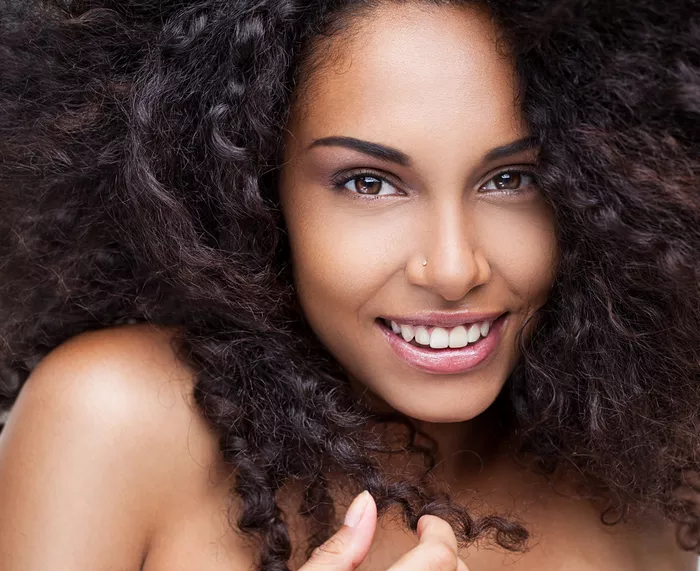My curly-coily hair has been a major part of my identity for as long as I can remember. A chop at six years old, to what could be graciously categorized as a TWA (Teeny Weeny Afro), remained until the age of twelve when I started growing it out. Then came over a decade of dedication to relaxer which smoothed out my curls, but ultimately sacrificed my hair health, before a transition to embracing my natural Type 3c & 4a texture. Today, with a growing patch of grey strands signaling another transformation, I know I feel my best when the volume of my curls ’n coils is cranked to 11. As far as my hairstyle is concerned, bigger is better.
Getting to this place of self-acceptance and self-confidence has been a journey dotted with ups and downs. Beyond Lisa Bonet and Scary Spice there weren’t many role models I could see myself in during formative years. That would be alienating enough for the average girl, let alone one as magazine obsessed as I was. Naomi’s pin straight locks I did not have. And finding suitable products in the hair care aisle at my local drugstore wasn’t easy either. Options were severely limited, for a long time a few pots relegated to a dusty corner of the store was as good as it got. So, it makes me giddy to walk the aisles now and see vast displays of treatment masks, nourishing leave-ins and styling creams from brands I pined for like Shea Moisture.
The US-based, Black-led line brought its award-winning, ethically sourced formulas north of the border in 2019, and is now the number one textured hair care brand in Canada. “We know that about three in five women in Canada identify as having textured hair, [as in] a wavy, curly and coily hair type,” says Maureen Kitheka, brand manager for Shea Moisture Canada, “The overall brand mission is to overserve the underserved consumer.” As Lizzo would say, it’s about damn time. I can attest that representation of diverse hair types and access to products that are made for it go hand in hand to creating a space where more people feel seen and supported within an inclusive definition of beauty.
In many ways, it’s an evolution I’ve been waiting for since I was six years old. But what I currently find most thrilling is the promise of just how much of an impact is possible. On a recent trip to Essence Festival of Culture in New Orleans with Shea Moisture, I had a front row seat to how the brand is bringing its purpose-driven M.O. to life, including a pop-up homage to its Harlem roots complete with hair styling bar, an epic media dinner hosted by best-selling author & TV host Bevy Smith and leading much-needed conversations about colourism in Hollywood with voices like hit-maker Coco Jones and Keisha Senter, who is VP of Culture & Impact for Jordan Peele’s Monkeypaw Productions. The scope also extends through The Dream Fund, which offers five Black female-owned businesses and founders in Canada a grant of 10 thousand dollars and personalized mentorship sessions. Along with consumer education and celebrating the beauty, magic and power of Black consumers, expanding support to Black communities through increased investment in Black entrepreneurs is an area Kitheka is excited to explore, too. “We want to unlock more opportunities for partnerships, sponsorships, collaboration, and, of course, more grant programs geared towards unlocking the dreams of Black entrepreneurs in Canada,” she says, “Wealth creation is a powerful tool in elevating our communities, and the Black community remains underserved in terms of the support available today to Black entrepreneurs.”
These strides, grounded in products that make my hair feel nurtured and beautiful, give me hope for the next generation growing up with textures like mine. While redefining care, and actively addressing the interconnected ways in which the beauty industry can positively touch more people’s lives, Shea Moisture is making sure the hair care aisle keeps getting bigger and better.


